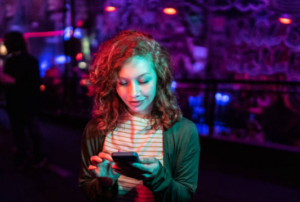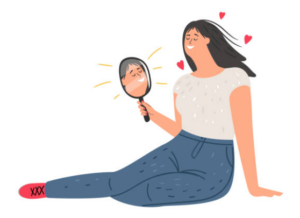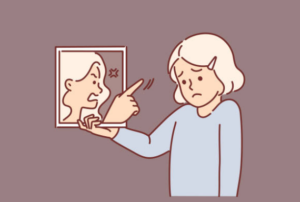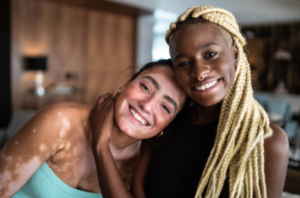The Beauty Paradox

In the kaleidoscopic realm of beauty, where trends shift as swiftly as a double-tap on Instagram, the concept of empowerment versus exploitation has become a central debate. As social media platforms like Instagram continue to redefine beauty standards, questions arise: Does the digital age liberate us to express our unique beauty, or does it shackle us to unattainable ideals? In this age of filters, influencers, and curated feeds, the line between empowerment and exploitation becomes increasingly blurred, revealing the intricacies of what we call the beauty paradox.
The digital landscape offers a double-edged sword for individuals seeking validation and self-expression. On one hand, platforms like Instagram provide a democratic stage where individuals can showcase their creativity, celebrate diversity, and challenge traditional beauty norms. From avant-garde makeup looks to body-positive campaigns, social media has become a canvas for self-expression, fostering a sense of inclusivity and empowerment for individuals of all backgrounds.
Yet, beneath the surface of curated feeds and flawless selfies lies a darker reality: the exploitation of insecurities and the perpetuation of unattainable beauty standards. As individuals vie for likes, followers, and validation, the pressure to conform to idealized images of beauty can erode self-esteem, fuel comparison culture, and perpetuate harmful stereotypes. Digital manipulation tools like Facetune and filters further distort perceptions of reality, creating an illusion of perfection that is both unattainable and unsustainable.
The Empowerment of Self-Expression
In the digital age, social media platforms like Instagram have democratized beauty, offering individuals a virtual stage to showcase their unique interpretations of self-expression. This newfound freedom has ushered in an era of creative experimentation and inclusivity, redefining traditional beauty standards and celebrating diversity in all its forms.
One of the most remarkable aspects of the empowerment of self-expression on social media is the dismantling of conventional beauty norms. Historically, mainstream beauty standards have been narrow and exclusionary, privileging certain features and perpetuating homogenized ideals of beauty. However, platforms like Instagram have disrupted this paradigm by amplifying diverse representations of beauty.
For instance, the rise of body positivity movements on social media has challenged the notion that beauty is synonymous with thinness or perfection. Influential figures such as Ashley Graham and Tess Holliday have leveraged their platforms to advocate for body acceptance and self-love, inspiring millions to embrace their curves and celebrate their bodies unapologetically.
Moreover, the beauty community on Instagram has become a vibrant tapestry of cultural expression, showcasing the rich tapestry of global beauty traditions. From intricate henna designs to vibrant tribal makeup, individuals are drawing inspiration from diverse cultural heritages and infusing their own interpretations into their beauty routines. This cross-pollination of ideas fosters a sense of cultural exchange and appreciation, bridging geographical divides and celebrating the universal language of beauty.
In addition to celebrating physical diversity, social media platforms have also become a catalyst for LGBTQ+ visibility in the beauty industry. Influential figures like NikkieTutorials and Bretman Rock have used their platforms to champion queer representation, challenging traditional gender norms and fostering a more inclusive beauty landscape. By embracing their authentic selves and sharing their stories with candor and humor, these influencers have paved the way for greater acceptance and visibility within the beauty community.
Furthermore, social media has democratized access to beauty education, empowering individuals to hone their skills and unleash their creativity. Platforms like YouTube and Instagram offer a plethora of tutorials, tips, and tricks, allowing aspiring makeup artists and beauty enthusiasts to learn from industry professionals and fellow creators. This democratization of knowledge levels the playing field and provides opportunities for individuals from all walks of life to pursue their passion for beauty.

The Exploitation of Insecurity
While the digital age has opened doors for self-expression and creativity, it has also ushered in a new era of exploitation, particularly concerning individual insecurities. Social media platforms like Instagram, with their emphasis on visual content and engagement metrics, have become breeding grounds for comparison culture and validation-seeking behavior. In this section, we delve deeper into the mechanisms through which insecurity is exploited in the digital beauty landscape.
Digital manipulation tools such as Facetune and filters have revolutionized the way individuals present themselves online. While these tools offer users the ability to enhance their appearance and create a polished image, they also perpetuate unrealistic beauty standards and erode authenticity. The prevalence of digitally altered images on social media creates a distorted perception of beauty, where flawless skin, perfect proportions, and impeccable features become the norm. In this digitally enhanced reality, individuals feel pressure to conform to unattainable ideals, leading to feelings of inadequacy and self-doubt.
In addition to digital manipulation, influencer culture exacerbates the exploitation of insecurity on social media. Influencers, who wield significant influence over their followers, often present curated versions of themselves that adhere to conventional beauty standards. From carefully staged photoshoots to sponsored content promoting beauty products, influencers project an image of perfection that can feel unattainable to their impressionable audiences. The pressure to maintain a flawless image can take a toll on influencers’ mental health, leading to anxiety, depression, and burnout.
Moreover, the commodification of beauty on social media further exploits individual insecurities for profit. Brands capitalize on these insecurities by marketing products that promise to remedy perceived flaws and enhance beauty. From skincare serums promising to erase wrinkles to weight loss teas pledging to shrink waistlines, the beauty industry capitalizes on consumers’ desire for validation and self-improvement. The relentless promotion of beauty standards through advertising perpetuates a cycle of consumption, where individuals seek external validation through materialistic means rather than cultivating self-acceptance and inner peace.
Furthermore, social media platforms perpetuate systemic inequalities and biases that disproportionately impact marginalized communities. Mainstream beauty standards often favor Eurocentric features, perpetuating colorism and marginalizing individuals who do not conform to these ideals. The underrepresentation of diverse beauty narratives reinforces harmful stereotypes and prejudices, exacerbating feelings of insecurity and inadequacy among marginalized groups.

Navigating the Beauty Paradox
As individuals navigate the complex terrain of beauty in the digital age, it becomes imperative to adopt a multifaceted approach that balances self-expression with self-care, authenticity with critical discernment. While social media platforms offer unprecedented opportunities for creativity and community-building, they also harbor pitfalls that can erode self-esteem and perpetuate toxic beauty standards. To navigate the beauty paradox effectively, individuals must cultivate self-awareness, resilience, and a critical lens when engaging with digital media.
First and foremost, fostering self-compassion is paramount in navigating the beauty paradox. Recognizing that imperfection is intrinsic to the human experience can mitigate the pressure to attain unattainable standards of beauty. Practicing self-care rituals that nurture both the body and the mind can foster a sense of inner peace and self-acceptance, independent of external validation.
Moreover, cultivating authenticity over perfection is essential in challenging conventional beauty norms and fostering genuine connections online. Embracing one’s unique identity and celebrating individuality empowers individuals to define beauty on their own terms, free from the constraints of societal expectations. By sharing authentic stories and experiences, individuals can forge meaningful connections with like-minded individuals who value diversity and inclusivity.
In addition to authenticity, fostering a diverse and inclusive online community is essential in challenging the homogenized beauty standards perpetuated by mainstream media. By amplifying marginalized voices and celebrating diverse representations of beauty, individuals can reshape the cultural narrative surrounding beauty, fostering a more inclusive and supportive online environment. Engaging with content that uplifts and empowers fosters a sense of solidarity and belonging, countering the isolation and inadequacy often perpetuated by comparison culture.
Furthermore, practicing digital detoxes and setting boundaries with social media consumption can safeguard against the detrimental effects of comparison and validation-seeking behavior. Taking regular breaks from social media allows individuals to reconnect with the present moment, nurture real-world connections, and cultivate offline hobbies that bring joy and fulfillment. Setting limits on screen time and curating a feed that aligns with one’s values and interests can create a more intentional and mindful experience of social media.
Moreover, fostering media literacy and critical thinking skills is essential in navigating the beauty paradox effectively. By interrogating the motives behind marketing messages and challenging unrealistic beauty standards, individuals can develop a more discerning perspective on the content they consume online. Questioning the authenticity of influencers and brands, scrutinizing digital manipulation techniques, and advocating for greater transparency in advertising practices empowers individuals to make informed choices and resist harmful narratives perpetuated by the beauty industry.

In essence, navigating the beauty paradox requires a holistic approach that prioritizes self-compassion, authenticity, and critical discernment. By fostering a sense of self-awareness, resilience, and empowerment, individuals can reclaim agency over their narratives and redefine beauty on their own terms. By challenging conventional beauty norms, fostering inclusivity, practicing self-care, and advocating for greater media literacy, individuals can navigate the digital landscape of beauty with confidence, resilience, and integrity.
In essence, the beauty paradox invites us to interrogate the ways in which digital platforms shape our perceptions of beauty and self-worth. By embracing the complexities of the digital landscape, we can harness its potential to empower and uplift, transcending the confines of conventional beauty standards to celebrate the beauty in all its diverse manifestations.

